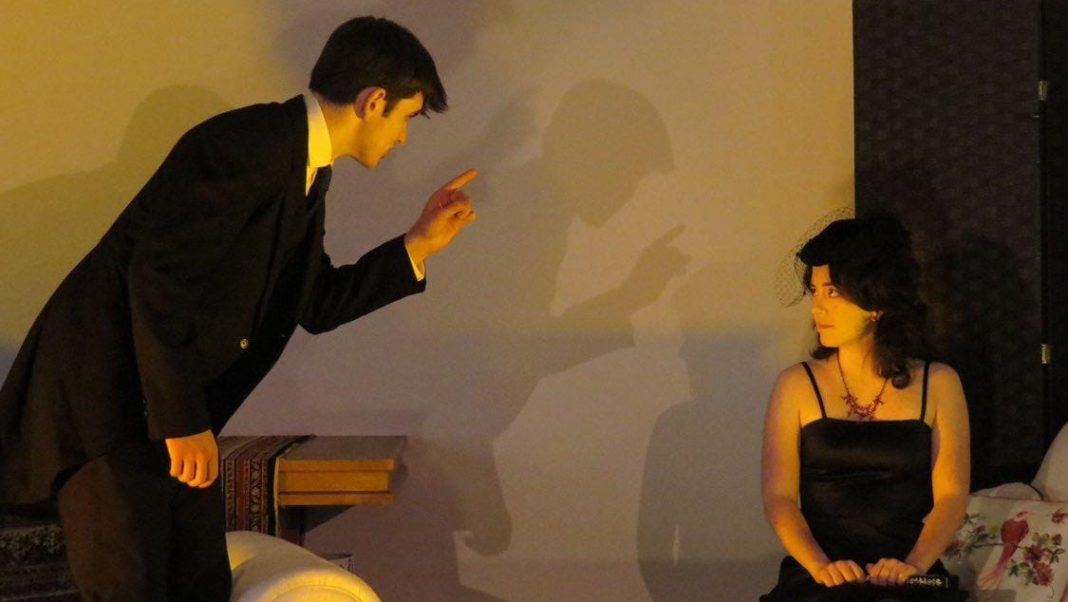An Ideal Husband is a guaranteed evening of refined fun. Carfax Productions’ take on Wilde’s classic play is charming and does the text’s wittiness justice. But don’t be deceived by its sparkling surface: a lot of thought and consideration has obviously gone into staging this and all its cast and crew should be very proud of the final product.
Wilde’s text follows a rising star politician Sir Robert Chiltern and his wife, Lady Gertrude Chiltern, both apparently upstanding citizens focused on improving society. The arrival of the mysterious, seductive, and – we quickly realise – dangerous Mrs Laura Cheveley has the potential to change everything. In possession of a secret that could dishonour Chiltern in the eyes of the public and, more importantly, of his own wife – for whom he is the paragon of goodness, the ideal husband – Mrs Cheveley is prepared to blackmail Chiltern into supporting the Argentinian canal scheme (a fraudulent venture).
At the door, producer Teddy Farrand generously offered me a programme that audience members otherwise had to pay for. Although this may seem like a strange choice for a student show, when you see the programme you will understand why. Including a preface by Dr Tim Manningmore, lecturer of English at Regent’s Park College, a director’s note by Anabelle Higgins, and plenty of photographs by Tomasz Hearfield, An Ideal Husband’s programme was as detailed and carefully put together as you’re likely to get.
Lucy Wheeler in the role of Mrs Laura Cheveley undoubtedly steals the show. She is ridiculously charming, but also brings a nuance to Wilde’s femme fatale which elevates every scene she is in. There is an intensity to her gaze and presence, which makes both her desperation and allure completely convincing. You can feel other characters being drawn in by her magnetic pull; when she is onstage all eyes are on her.
George Porteous, Rose Hansen, and Will Hamp also give great performances. Porteous as Lord Arthur Goring had the audience in his palm, he is effortlessly funny and every bit the dandy without ever falling into caricature. Rose Hansen brings maturity and seriousness to her role, which sets her character apart from all the frivolous, fast-speaking socialites that come in and out of her home. According to the programme, both Hansen and Porteous are American. Their accent work was truly astonishing – they sounded more Victorian than some of their British castmates! Finally, Will Hamp’s earnestness wins us over to Sir Robert Chiltern, managing to get across that despite past indiscretions Chiltern is a good, honest man.
The supporting cast was also strong. Marcus Phillips’s outrageous French accent is particularly funny. He is barely onstage, but his performance is certainly memorable. Occasionally, however, it felt like the physical humour brought by the ensemble clashed with the more subtle performances from the lead cast.
Louise Guy’s sound design is a highlight: the live piano music – played by Guy herself and Louis Fletcher – adds greatly to the show’s elegance. Rowena Sears also deserves a massive congratulations for her costume design. Not only is she able to completely transport us to the period, but her costuming choices encapsulate the essence of the play’s characters: the juxtaposition between Cheveley’s risque black dress and Gertrude’s practical New Woman skirt and top visually sets the two up as foils.
The show was at its weakest when it came to overcoming the challenges of the venue. Regent’s Park Chapel seems an awkward space to stage any piece of theatre, but especially one where characters are constantly walking in and out of rooms. Entrances and exits had a tendency to feel awkward and overly prolonged. Probably due to the limited space, actors also had a tendency to stand in a line while delivering their lines, which especially when the stage became crowded was slightly awkward.
Lighting a chapel is always complicated, but this lighting designer had a particularly difficult job. Unfortunately, the difficulties of the venue seemed to prevail. Lit entirely by two uplighters, characters were more often than not poorly lit and the angles at which these lights were positioned cast strange shadows all over the back wall. For a play that was otherwise naturalistic in its design, the occasional use of blue lighting worked against the show. Although I understand it was meant to emphasise the characters’ emotional states, it mostly hampered the performances, cheapening their dramatic impact.
Minor technical issues aside, Annabelle Higgins is a director to watch out for. Her passion for the play comes across from start to finish and she is clearly able to get great performances out of her actors. Next time Carfax Productions puts on a play, however, they might consider having their actors read Cherwell rather than The Isis.


